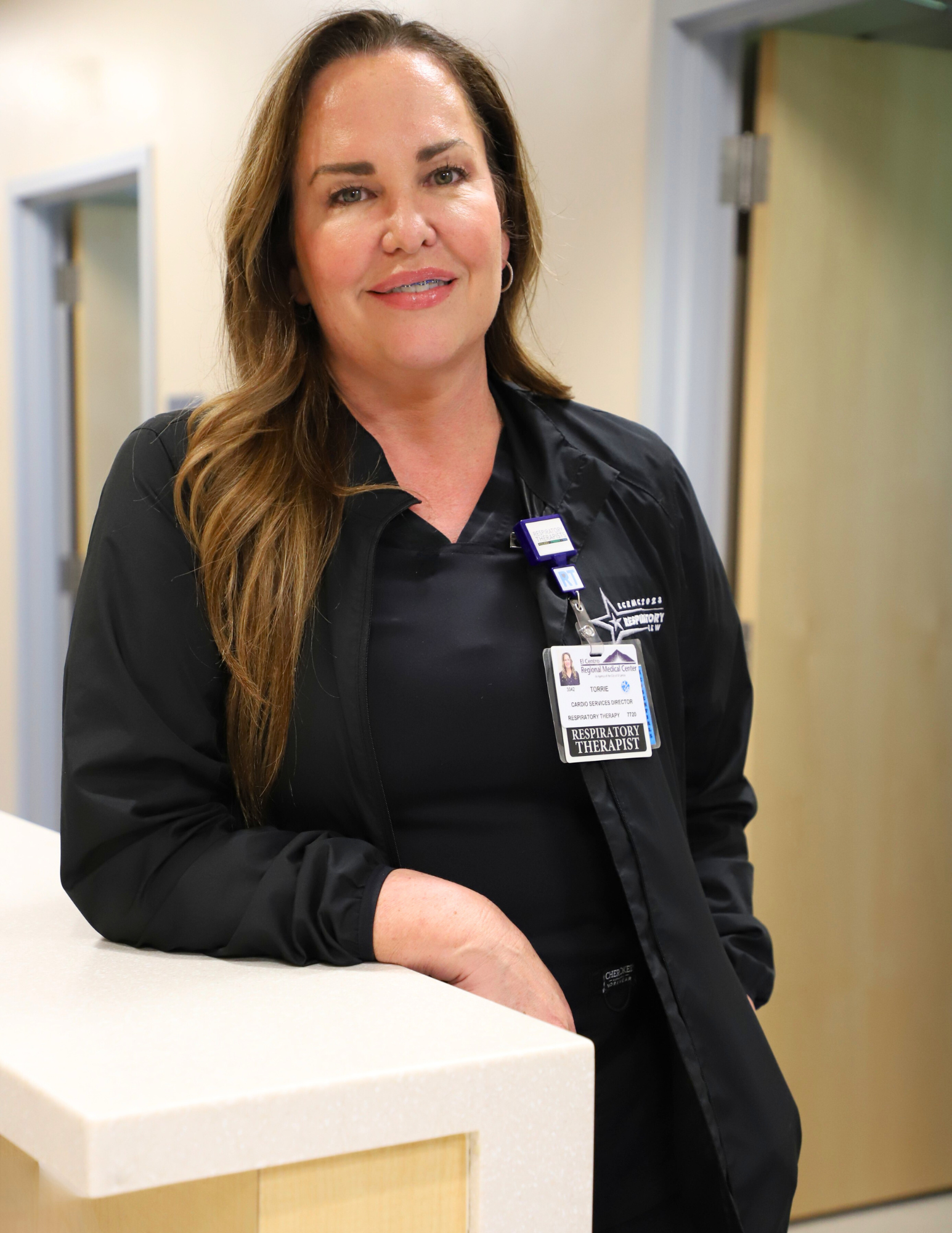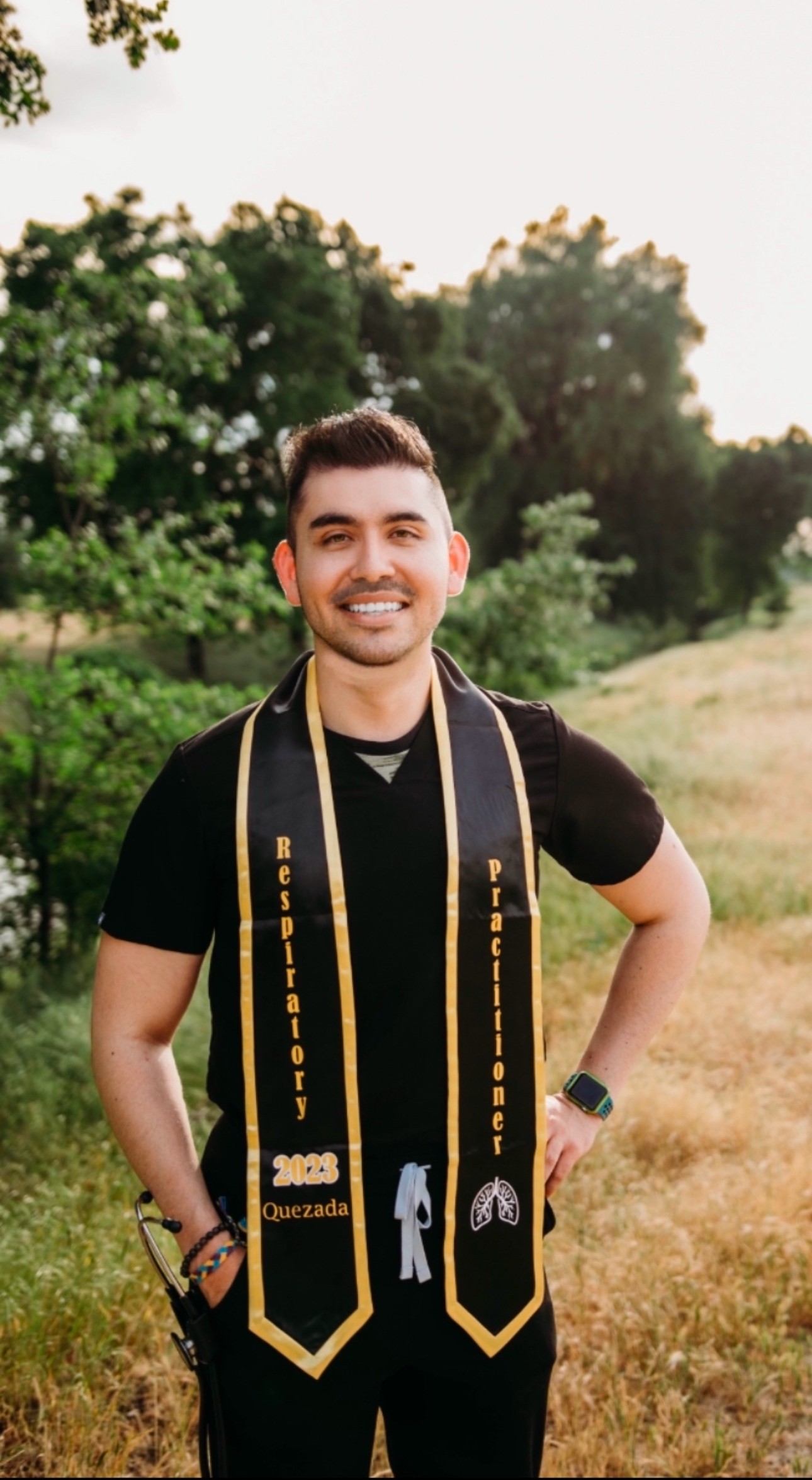Meet a Respiratory Care Practitioner (RCP)
The Respiratory Care Board is proud to highlight licensed Respiratory Care Practitioners (RCPs) who exemplify professionalism, compassion, and dedication to public health across California.
This feature series celebrates the diverse roles RCPs hold, from bedside clinicians and educators to leaders and innovators in the field. Each individual spotlight offers a glimpse into their career journey, daily impact, and commitment to high-quality, evidence-based care.
By sharing these stories, the RCB aims to promote greater awareness of the profession and honor the vital contributions of California’s RCPs in safeguarding patient safety and advancing respiratory care.
-
Torrie Staten, RCP 19318

Torrie Staten – A Breath of Leadership in Respiratory Care!
The Respiratory Care Board is proud to spotlight Torrie Staten, a dedicated respiratory care practitioner (RCP) whose impactful work is enhancing the lives of California’s respiratory care patients.
The Inspiring Journey of Torrie Staten, MSRC, RRT, AE-C: Empowering Patients and Uplifting Communities
Asthma sufferers in Imperial County, California, are breathing easier thanks to a groundbreaking initiative led by respiratory therapists. The Asthma Community Linkages Project (ACLP), developed and implemented by a team led in part by Torrie Staten, has demonstrated significant success in improving asthma management for residents of this rural, underserved border region.
A Calling to Respiratory Care
Torrie’s journey into respiratory care began in an allied health class at College of the Desert, where a video titled “Breath of Life” first captured her attention.
“I found it exciting to see how RTs work in every area of the hospital and focus on the science of breathing,” she recalls.
That spark led her to become a licensed RCP in 1996 and ultimately earn her Master of Science in Respiratory Care from Loma Linda University.
Her educational path—from California Paramedical and Technical College to PIMA Medical Institute and Loma Linda University—helped her build not only clinical expertise but also the leadership skills necessary to influence systems-level change.
That leadership is evident in the success of the ACLP, which Torrie co-developed to address asthma in Imperial County through a holistic, community-driven approach. The program offers:
- Home Visits: Respiratory therapists and community health workers conducted home assessments to identify and mitigate asthma triggers, providing supplies like air purifiers and HEPA vacuum cleaners.
- Personalized Action Plans: Tailored care plans were developed to empower patients with the tools and knowledge needed to manage their asthma effectively.
- Community Support: The program integrated social support services to address barriers like food insecurity, transportation, and housing.
The impact of the ACLP has been transformative:
- Improved Health: Asthma Control Test (ACT) scores for participants increased significantly, from 15.5 to 21.33, reflecting better symptom management and control.
- Reduced Emergency Visits: Emergency department visits dropped by 77% for patients who completed all program components, showcasing the effectiveness of comprehensive care.
- Empowered Patients: Participants gained long-term self-management skills, fostering independence and resilience.
“This program isn’t just about treatment—it’s about empowerment,” Torrie says. “We give people the tools to manage their condition and the support to thrive.”
From Crisis to Clarity
The COVID-19 pandemic tested Torrie’s leadership in profound ways. “Serving as a director during the pandemic was one of the most demanding and isolating experiences of my career,” she shares.Burnout was real, but so was her resolve. "They became my work family. Their encouragement helped reignite my passion.”
That experience reinforced her belief in the power of community—within both the hospital and the broader region she serves.
Advice for the Next Generation
“Step boldly into your new career—don’t be afraid to embrace roles that stretch you beyond your comfort zone. Respiratory care practitioners are needed at every level of healthcare, from the bedside to the boardroom. Your voice and perspective matter.”
A Scalable Model for the Future
The ACLP highlights the vital role of respiratory therapists as leaders in interdisciplinary care teams. By addressing the environmental and social factors contributing to asthma, the program provides a scalable and replicable model for improving health outcomes in underserved communities worldwide.
With these successes, the ACLP sets the stage for expanding similar programs to other regions facing healthcare disparities. It also underscores the importance of innovative, community-focused healthcare strategies in tackling chronic diseases like asthma.
For those struggling with asthma, this project brings hope and a reminder that equitable healthcare solutions can transform lives. The ACLP team’s work not only enhances health outcomes but also serves as a beacon for how healthcare professionals can drive meaningful change in their communities.
“We are stronger together. And with the right support, education, and leadership, we can build healthier communities—one breath at a time.”
Thank you, Torrie, for your ongoing commitment to the patients served by the respiratory care profession! Your performance shines as a model for others!
-
Alex Quezada, RCP 46348

Alex Quezada began his career in healthcare as an emergency room technician, where he developed a deep appreciation for the vital role respiratory care practitioners play, especially during the COVID-19 pandemic. That experience inspired him to pursue a career in respiratory care, recognizing RCPs as key members of the care team who often work behind the scenes to make a critical difference.
Today, Alex is a licensed RRT at Adventist Health, Tulare, where he provides a wide range of services including breathing treatments, ventilator management (both invasive and non-invasive), arterial blood gas testing, and EKGs. He responds to all codes and rapid responses, attends births, and assists with conscious sedations, playing an integral role across various departments.
Alex earned his associate degree in respiratory therapy from San Joaquin Valley College (SJVC) and later completed his bachelor’s degree at Boise State University. He recalls his time in school fondly, especially the strong bonds formed with his cohort!
The most rewarding part of his work is helping patients breathe easier and witnessing their daily progress. One experience that stands out for Alex was his first extubation, seeing his patient breathe on their own again after being on a ventilator was a powerful reminder of the impact RCPs can make.
Like many in the profession, Alex acknowledges that losing patients can be difficult. He copes by reflecting on each case, evaluating how things went, and leaning on the strength of teamwork and shared effort.
For new graduates entering the field, Alex offers this advice:
“Step into this with an open mind. Take every opportunity thrown at you. Never get comfortable and always stay hungry for learning.”
Outside of work, Alex is just as active. He serves as a social media ambassador for the National Board for Respiratory Care (NBRC) and has been involved in community theater for over 20 years, both onstage and as a member of the board of directors for a local theater group.
Whether in the hospital or on the stage, Alex brings dedication, compassion, and a genuine commitment to making a difference.
Let’s celebrate Alex and the important work he does every day to protect patient health and ensure safe, effective respiratory care!
-
Gary Phelps, RCP 15273

Gary Phelps, RRT, MPH, has dedicated his career to advancing respiratory care while leading with compassion and integrity. As the Manager of Pulmonary Services at Sharp Grossmont Hospital in San Diego, he oversees all aspects of departmental operations, from quality assurance and staff training to compliance and patient-centered service. His work extends beyond administration, Gary actively collaborates with medical staff, participates in hospital committees, and ensures that his team delivers the highest standards of care.
Gary’s journey into respiratory care began in the U.S. Navy, where he served as a Hospital Corpsman. He completed respiratory therapy training at Fort Sam Houston’s Brooke Army Medical Center and later trained as a combat medic, gaining experience in setting up and running field hospitals for wounded soldiers. After his military service, he pursued his AS in Respiratory Therapy from the California College for Health Sciences, followed by BS and MPH degrees at Grand Canyon University. Reflecting on his path, Gary credits his military training with giving him the discipline and confidence to excel in both education and clinical practice.
While Gary initially planned to become a physician, he discovered respiratory care during corpsman training and was drawn to the field’s unique challenges and responsibilities. What he enjoys most is the ability to help patients during critical moments, whether in the ICU, trauma bay, operating room, or even through specialized roles like flight therapy and ECMO. “We care for patients of all ages, from neonates to the elderly,” he says.
“There’s no greater satisfaction than helping someone breathe easier.”
Gary acknowledges the emotional toll of working with severely ill or injured patients but emphasizes the importance of healthy coping mechanisms and strong support systems. He also highlights the need to approach every interaction with empathy, understanding that patients and families may not share the same knowledge, perspective, or even beliefs as their care team. “I strive to advocate for patients’ wishes and respect their values, no matter the circumstances,” he notes.
When asked about memorable experiences, Gary recalls countless moments of easing a patient’s fear and anxiety by restoring their ability to breathe, alongside the collective resilience of health care teams during the COVID-19 pandemic. “It was one of the most difficult times in health care, yet everyone came together to do their best for patients,” he reflects.
For new graduates entering the profession, Gary offers this advice: “Be a sponge. Learn everything you can, retain it, and practice it. Every clinical day is a working interview—make a positive impression, ask questions, and seek out every opportunity to grow.”
To Gary, the most rewarding aspect of being a respiratory care practitioner is the wide-reaching impact of the profession across health care settings and patient populations. “Respiratory care practitioners are the unsung heroes of the health care team,” he says with pride.
We thank Gary for his dedicated service to our country and his continued commitment to the respiratory care profession. His leadership, compassion, and advocacy embody the best of what it means to be an RCP, and we are proud to highlight his story.




